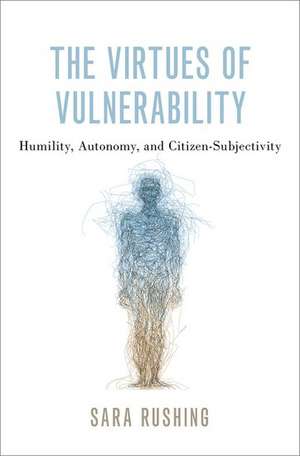The Virtues of Vulnerability: Humility, Autonomy, and Citizen-Subjectivity
Autor Sara Rushingen Limba Engleză Hardback – 12 ian 2021
Preț: 478.92 lei
Preț vechi: 527.21 lei
-9% Nou
Puncte Express: 718
Preț estimativ în valută:
91.64€ • 95.88$ • 76.13£
91.64€ • 95.88$ • 76.13£
Carte disponibilă
Livrare economică 01-07 martie
Preluare comenzi: 021 569.72.76
Specificații
ISBN-13: 9780197516645
ISBN-10: 0197516645
Pagini: 226
Dimensiuni: 236 x 163 x 23 mm
Greutate: 0.45 kg
Editura: Oxford University Press
Colecția OUP USA
Locul publicării:New York, United States
ISBN-10: 0197516645
Pagini: 226
Dimensiuni: 236 x 163 x 23 mm
Greutate: 0.45 kg
Editura: Oxford University Press
Colecția OUP USA
Locul publicării:New York, United States
Recenzii
The book brims with ideas, insights, citations, distinctions, takes, analogies, and asides. The scholarship is impressive, and the writing is welcoming.
Sara Rushing has written a breathtaking book that places fleshy bodies at the center of citizenship. Examining medical encounters across the lifespan, from birth to illness to death, Rushing provocatively argues that bodily fragility can create conditions for autonomy, not just dependence. Vulnerability decimates fantasies of sovereignty and exposes us to felt experiences of humility, which can, surprisingly, bolster our agency and teach us how to be better citizens of our damaged democracy. The Virtues of Vulnerability is a gorgeously written work of political theory and feminist studies that could not be more timely.
Where Foucault focused on the birth of the clinic, Sara Rushing's splendid new book offers a political theory of the clinic. In the sites where we birth, die, or heal, Rushing finds not just an alienating health matrix that reconstitutes autonomously choosing subjects of self-mastery, but people practicing the virtues of vulnerability and humility. Detailed, thoughtful, intense, and witty,The Virtues of Vulnerability is a pleasure to read from start to finish.
Sara Rushing's notion that humility needs autonomy — not the masterful sovereign autonomy of traditional social contract theory but the autonomy of an individual in relationship with herself and others — is a major theoretical innovation. Her related idea that autonomy needs humility insofar as it is an ongoing process (and thus never settled or done) is similarly critical. If only the people who set up the kinds of clinics and spaces (for birth, for life, for death) that Rushing describes here read her book! Better yet, if the 'patients' who populate these spaces could read The Virtues of Vulnerability there would be a revolution in terms of care, agency, and the power of the citizen-subjects that she describes.
Sara Rushing has written a breathtaking book that places fleshy bodies at the center of citizenship. Examining medical encounters across the lifespan, from birth to illness to death, Rushing provocatively argues that bodily fragility can create conditions for autonomy, not just dependence. Vulnerability decimates fantasies of sovereignty and exposes us to felt experiences of humility, which can, surprisingly, bolster our agency and teach us how to be better citizens of our damaged democracy. The Virtues of Vulnerability is a gorgeously written work of political theory and feminist studies that could not be more timely.
Where Foucault focused on the birth of the clinic, Sara Rushing's splendid new book offers a political theory of the clinic. In the sites where we birth, die, or heal, Rushing finds not just an alienating health matrix that reconstitutes autonomously choosing subjects of self-mastery, but people practicing the virtues of vulnerability and humility. Detailed, thoughtful, intense, and witty,The Virtues of Vulnerability is a pleasure to read from start to finish.
Sara Rushing's notion that humility needs autonomy — not the masterful sovereign autonomy of traditional social contract theory but the autonomy of an individual in relationship with herself and others — is a major theoretical innovation. Her related idea that autonomy needs humility insofar as it is an ongoing process (and thus never settled or done) is similarly critical. If only the people who set up the kinds of clinics and spaces (for birth, for life, for death) that Rushing describes here read her book! Better yet, if the 'patients' who populate these spaces could read The Virtues of Vulnerability there would be a revolution in terms of care, agency, and the power of the citizen-subjects that she describes.
Notă biografică
Sara Rushing is an Associate Professor of Political Science at Montana State University, Bozeman, and Co-President of the Association for Political Theory from 2020-2022.
